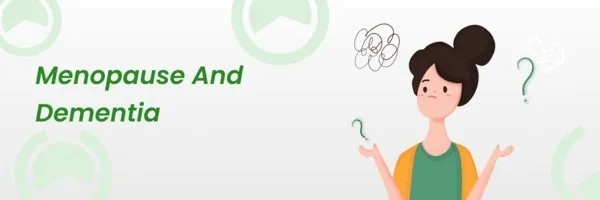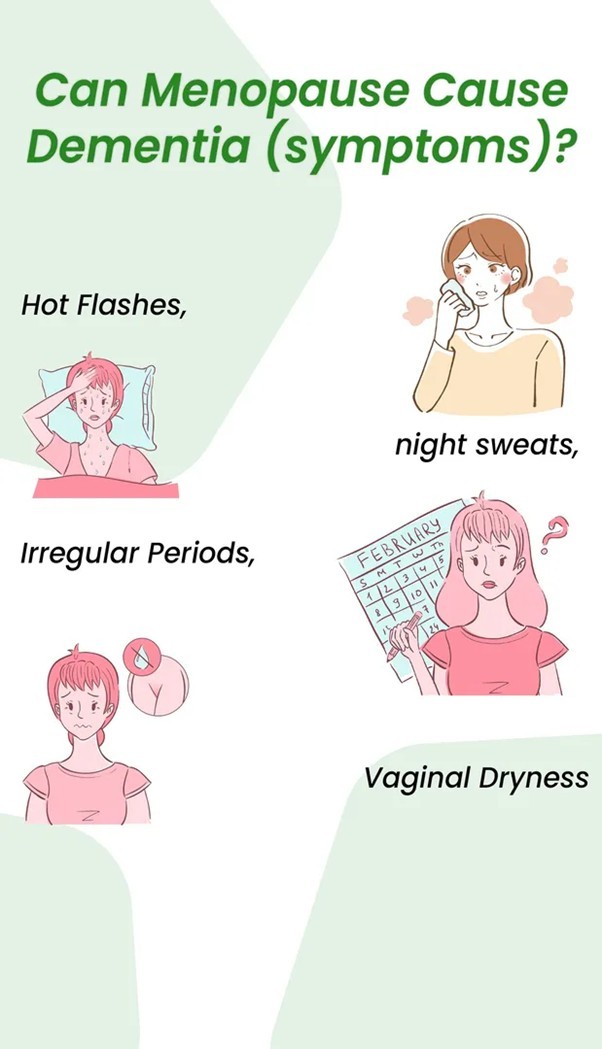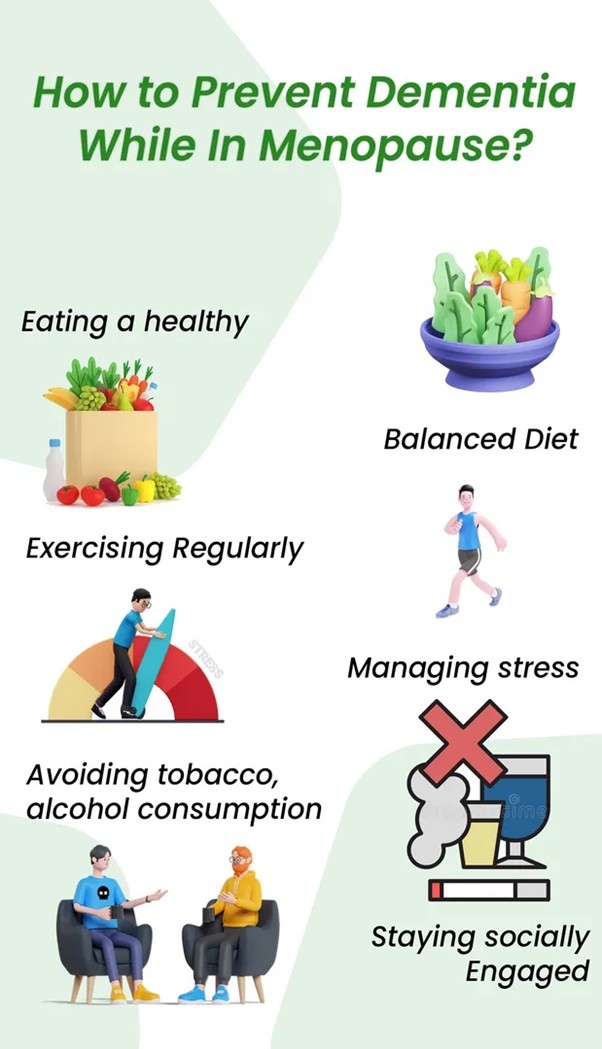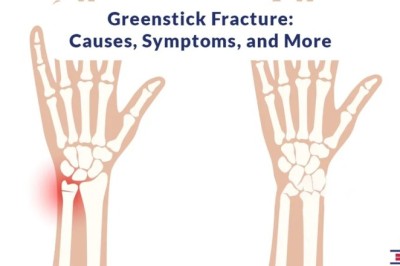views

Dementia is a set of symptoms that severely impair memory, reasoning, and social skills when they considerably interfere with daily functioning.
Although there isn't one particular illness that causes dementia, many diseases can. Although memory loss is a common sign of dementia, it can also have many other causes, one of which could be menopause.
Do you Know?
Age is the leading risk factor for dementia; Women are more likely than males to suffer from an illness like dementia, making up 65% globally.
Women who experience early menopause before age 40 are 35% more likely to acquire some dementia later in life.
Additionally, dementia before age 65 is 1.3 times more likely in women who reach menopause before age 45.
Dementia is a general term for a decline in cognitive function, including memory, language, problem-solving, and other mental abilities. It is a common condition in older adults.
Menopause could be one of the symptoms of dementia and can vary depending on the underlying cause and the severity of the condition.
Menopause is the natural transition that occurs in women when the ovaries stop producing eggs and the production of certain hormones, including estrogen, declines. Common symptoms of menopause include hot flashes, night sweats, irregular periods, and vaginal dryness.
Early diagnosis and treatment of dementia are crucial. But if we could avoid it entirely, that would be even better.
You must be amazed to know!
According to research from Japan ( journal Nutritional Neuroscience).
A high-fiber diet has lately been linked to a lower risk of dementia development.
Still, studies have shown there is no definitive evidence that menopause itself can cause dementia.
Are you interested in learning more about menopause and dementia?
Keep reading ahead!!
Early menopause and dementia
Early menopause, defined as the onset of menopause before age 45, has been associated with an increased risk of developing dementia later in life.
However, the exact relationship between the two needs to be better understood, and more research is needed in this area.
It is known that estrogen, a hormone produced by the ovaries that regulate the menstrual cycle, may have protective effects on the brain.
Therefore, the sudden decrease in estrogen levels during menopause may increase the risk of cognitive decline and dementia.
Do you know what causes dementia? Let's look at some causes below.
Can menopause cause dementia?
Early menopause is associated with an increased risk of dementia later in life.
There could be many reasons regarding the cause like-

One of the reasons may be due to the sudden decrease in estrogen levels that occurs during menopause, as an estrogen has been shown to have protective effects on the brain.
And other could be women going through perimenopause and menopause experiencing "brain fog," where they experience symptoms like having hot flashes and forgetting names, appointments, etc.
However, it is not necessary.
Dementia is the cause behind it.
In a word, There isn't currently any evidence that menopause causes dementia.
How does menopause lead to dementia?
While there are several possible explanations for why women are more prone to get dementia, one of the leading ones is the estrogen hormone.
However, it is thought that the sudden decrease in estrogen levels during menopause may increase the risk of cognitive decline and dementia.
Estrogen has been shown to have protective effects on the brain, and losing this hormone during menopause may contribute to dementia.
Furthermore, other factors, such as
● Genetics,
● lifestyle,
● overall health
It may also play a role in the development of dementia.
Could a change in estrogen levels affect the risk of getting dementia?
Let's take a closer look at their relationship below!
Low Oestrogen and dementia
Estrogen is a hormone produced by the ovaries and plays a role in regulating the menstrual cycle. It has also been shown to have protective effects on the brain.
Therefore, a sudden decrease in estrogen levels, such as during menopause, may increase the risk of cognitive decline and dementia.
It has also been seen that serotonin, acetylcholine, and dopamine are used to transmit impulses throughout the brain and can also be affected by estrogen. Some Alzheimer's disease symptoms have been attributed to issues with the acetylcholine signaling pathway, which may be related to low estrogen levels.
However, more research is needed to understand the exact relationship between low estrogen levels and the development of dementia.
Dementia shows symptoms much as any other illness does.
One should be aware of them, no matter how little!
Let's read out!
Can menopause cause dementia-like symptoms?
Menopause is the natural transition that occurs in women when the ovaries stop producing eggs and the production of certain hormones, including estrogen, declines.
Common symptoms of menopause include
● hot flashes,
● night sweats,
● irregular periods,
● vaginal dryness.
It is important to note that menopause is not always a cause of dementia.
However, early menopause has been associated with an increased risk of developing dementia later in life.
If you are experiencing symptoms of menopause and are concerned about your cognitive health, it is recommended that you speak with your doctor for further evaluation and advice.
Now let's discuss,
What is the likelihood of getting dementia during menopause?
It is difficult to determine the chance of developing dementia during menopause.
The exact relationship between the two needs to be better understood, and more research is needed in this area.
Additionally, the likelihood of developing dementia can vary depending on several factors, including genetics, lifestyle, and overall health.
While early menopause has been associated with an increased risk of developing dementia later in life, it is essential to note that not all women who experience early menopause will develop dementia. Not all women who develop dementia have a history of early menopause.
Do you believe in the saying,
Is prevention better than cure?
Then make sure to read the next section.
How to prevent dementia while in menopause?
There is no known way to prevent dementia. However, there are some steps you can take to maintain good cognitive health and potentially reduce your risk of developing dementia.
These steps include:

● Eating a healthy and High fiber diet
● Exercising regularly
● Getting enough sleep
● Managing stress
● Avoiding tobacco and excessive alcohol consumption
● Staying socially engaged and mentally active.
It is also essential to manage other health conditions, as these can affect your cognitive health.
Dont worry.
We also have a solution for your problem
Let's scroll down!
Is there any treatment for curing dementia during menopause?
Yes, we have!
Here, we have listed a few treatments, such as medications and therapies for dementia during menopause.
● Hormone replacement therapy: This treatment involves taking hormone therapy such as estrogen and progesterone to replace the ones that are lost during menopause. HRT can help alleviate some of the symptoms of menopause, including memory loss and cognitive decline.
● Cognitive behavioral therapy: This therapy helps individuals with dementia learn new strategies to manage their symptoms and improve their overall cognitive function.
● Medications: Certain medications, such as cholinesterase inhibitors, may be prescribed to help improve cognitive function in individuals with dementia.
● Alternative therapies: Some individuals may find relief from dementia symptoms through alternative therapies, such as acupuncture, herbal remedies, and meditation.
Call today and get free Consultation!
























Comments
0 comment